Pre-Trial Developments in the Minneapolis Police Officers (George Floyd Murder) Case
On June 3, Minnesota Attorney General Keith Ellison upgraded the charge against Chauvin to second-degree murder and charged the other three officers at the scene with aiding and abetting murder and manslaughter. The decision came two days after, at the request of Governor Tim Walz, Ellison took over the prosecution from Hennepin County Attorney Mike Freeman. The three former officers who were present but failed to intervene were booked into the Hennepin County jail. The prosecution of the four officers was begun quicker than any case in Minnesota history involving officers on the job who killed civilians.
Speaking to the press, Ellison said, “To the Floyd family, to our beloved community, and everyone that is watching, I say: George Floyd mattered. He was loved. His life was important. His life had value. We will seek justice for him and for you and we will find it.” In response to a question, Ellison dismissed the idea that intense public pressure affected the process.
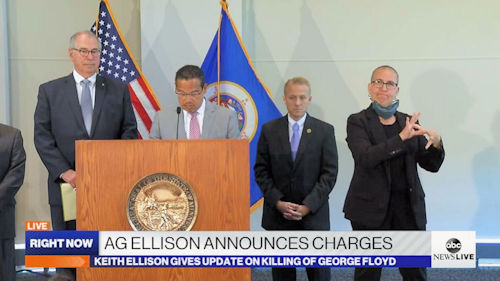
Minnesota Attorney General Keith Ellison announcing new charges in the Floyd case
Governor Walz said after the new charges were announced, “I laid flowers at George Floyd’s memorial this morning. As a former high school history teacher, I looked up at the mural of George’s face painted above and I reflected on what his death will mean for future generations. What will our young people learn about this moment? Will his death be just another blip in a textbook? Or will it go down in history as when our country turned toward justice and change?” He added, “It’s on each of us to determine that answer.”
Benjamin Crump, an attorney representing Floyd’s family, Benjamin Crump, also commented on the charges against the officers. He said the move was “a significant step forward on the road to justice” and expressed gratitude that “this important action was brought before George Floyd’s body was laid to rest.”
On June 4, attorneys for two former rookie Minneapolis police officers, Hueng and Lane, said that any blame for the killing of George Floyd rested on Officer Chauvin, the senior officer who they said ignored their inexperienced clients.
J Alexander Kueng, Thomas K. Lane, and Tou Thao made their first court appearances. Hennepin County District Judge Paul Scoggin set bail for each of the other three at $1 million without conditions, or $750,000 with conditions. The bail hearing turn contentious when Lane’s attorney, Earl Gray, argued, “What is my client supposed to do but follow what the [senior] officer says? What was [Lane] supposed to do … go up to Mr. Chauvin and grab him and throw him off?” Gray noted that his client twice asked Chauvin if they should roll Floyd on to his side, but Chauvin rebuffed the suggestion. Lane’s attorney called the strength of the state’s case “extremely weak.” Kueng’s attorney, Thomas Plunkett, made similar arguments. Plunkett told the court, “[Kueng] was trying — they were trying to communicate that this situation needs to change direction.” On the other hand, Thao’s attorney, Robert Paule, made no attempt to shift blame to Chauvin, his client’s partner.
Assistant Attorney General Matthew Frank countered by arguing that the charges were “very serious” and that the officers were “flight risks.”
Gray indicated he would file a motion to argue that there’s not enough evidence to prosecute Lane. Asked whether Lane had a duty to get Chauvin off Floyd’s neck, Gray said, “I guess the jury will decide that. In my opinion, no. It would be unreasonable for my client to go up and drag Chauvin off the deceased. … You’ve got a 20-year [sic] cop in the front and my guy’s back there with four days and he says, ‘Should we roll him over?’ and [Chauvin] says, ‘No, we’ll wait for the ambulance’ twice. … I don’t know what you’re supposed to do as a cop.”
On June 12, Hennepin County District Judge Peter Cahill was assigned the unenviable task of trying the MPD case. Cahill began his career as a defense attorney before serving as the top staff attorney to U.S. Sen. Amy Klobuchar when she was county attorney. He was appointed to the bench by Governor Tim Pawlenty. Cahill has tried a number of high-profile cases and has a reputation for being decisive and direct. Cahill's first decision in the case was to reject a defense request to allow camera in the pretrial hearing. Cahill noted that Minnesota court rules require both the defense and prosecution to agree in order for cameras to be admitted. The judge also wrote in his June 26 order that "Given that this is a case that has already received substantial pretrial media coverage, the Court finds that audio or video coverage of the pretrial hearings. . . would risk tainting a potential Hennepin County jury pool.”
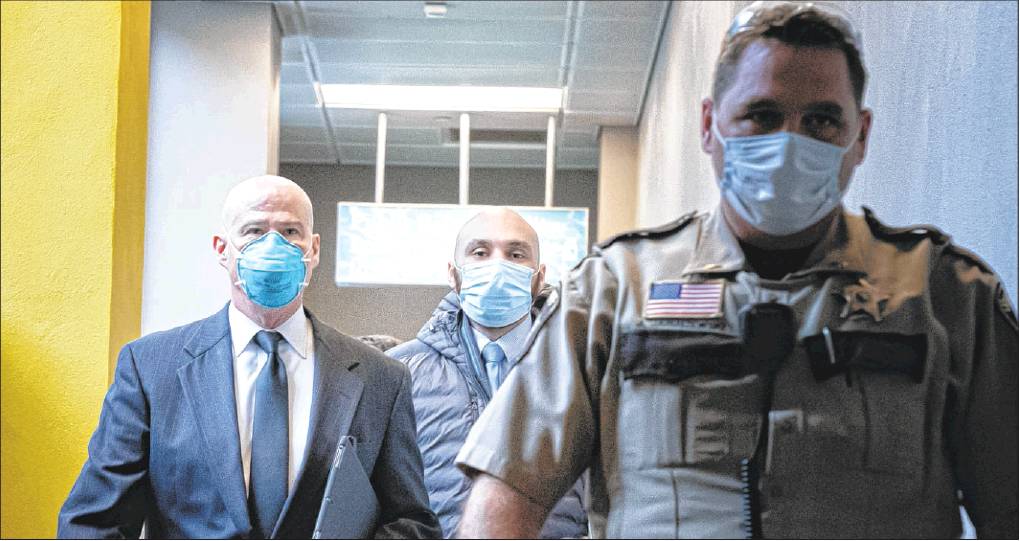
Attorney Thomas Plunkett and his client (center), Alexander Kueng
At a June 29 hearing, Judge Cahill expressed concern about comments by public officials that could jeopardize the right of the defendants to a fair trial. Cahill said "it's in everybody's best interest" that officials stop making public statements about the case. "What they're doing is endangering a fair trial. They need to know that." Thao's attorney, Robert Paule complained "I'm facing an uphill battle" because of the pretrial publicity, and added that he planned to file a motion for a change of venue. Lead prosecutor, Assistant Attorney General Matthew Frank, said he would relay the judge's comments "as much as we can," but noted that "legally, we don't have control over them."
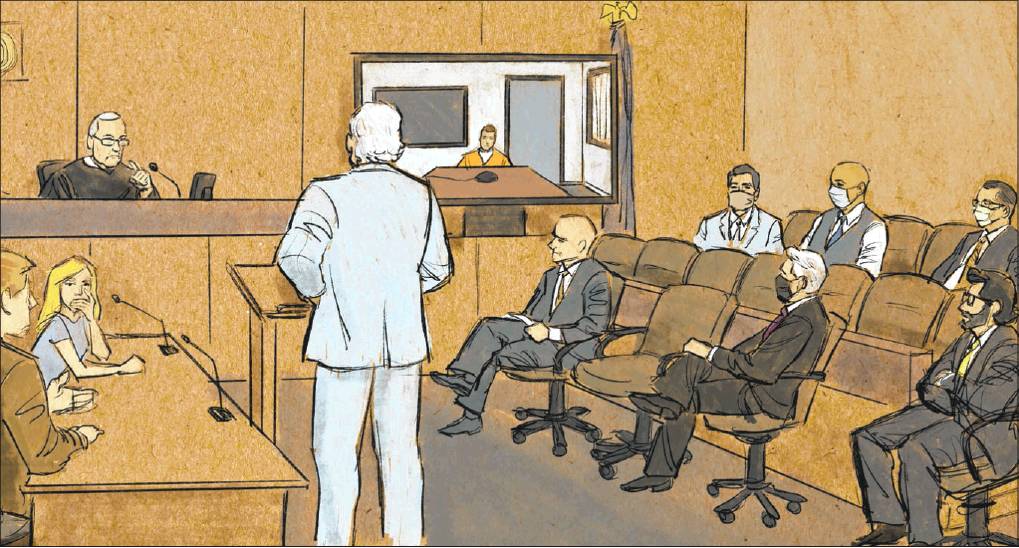
Judge Cahill presides at a July 21, 2020 hearing (Star Tribune)
His concern over pretrial publicity growing, Judge Cahill took the unusual step on July 9 of issuing a gag order that applied to all attorneys participating in the case. Eric Nelson, attorney for Derek Chauvin, responded by filing a motion that the gag order violated the First Amendment and the right to a public trial. Nelson wrote, “If anything, the gag order should apply only to the State and county prosecutors, who have enjoyed a lengthy, unrestricted media honeymoon, during which to comment and posit and discuss this case at length — likely in violation of their ethical duties.” A coalition of media companies, including the Associated Press, the New York Times, and the Star Tribune, challenged the judge’s gag order, asking that it be vacated. Coalition attorneys called the gag order overbroad and said, “The Court’s Order in these cases threatens to prevent the press and the public from obtaining meaningful information related to these highly newsworthy prosecutions from a wide — and overly broad — range of interested parties." Judge Cahill vacated his gag order at a July 21 hearing after polling parties as to whether they agreed that the order should remain in place. No one raised a hand. Cahill said "the gag order didn’t work,” adding that “if anything it may have exacerbated the issue” by causing parties to “tiptoe” around in their public statements and causing the news media to rely on anonymous sources.
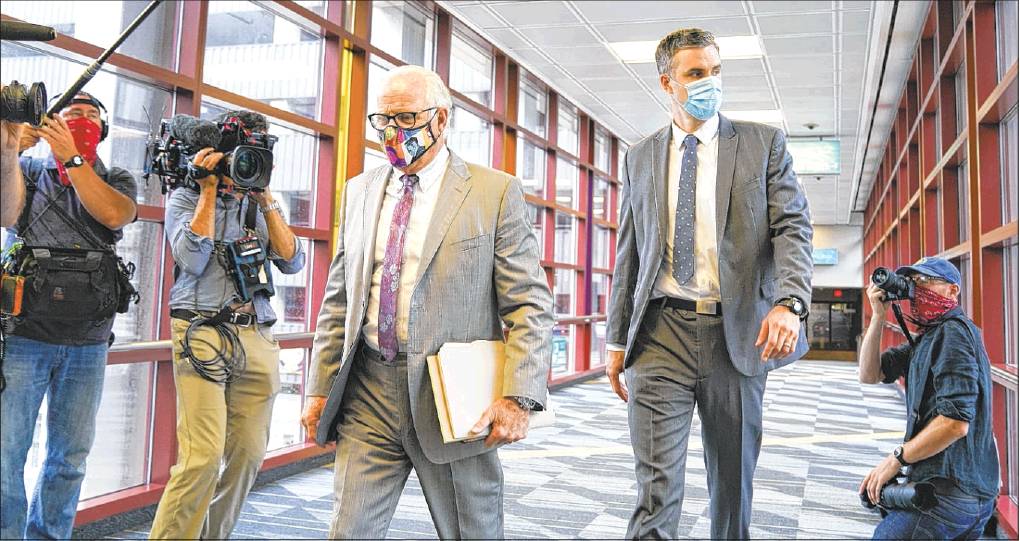
Attorney Earl Gray walking with his client, Thomas Lane
It remains to be seen whether the four officers will be tried together or separately, though Lane's attorney, Earl Gray, has indicated that he will file a motion for a separate trial.
On July 7, Thomas Lane's attorney filed a motion asking that all charges against his client be dismissed. Lane's attorney cited the transcript of police video cameras which show that Lane twice suggested to Chauvin that Floyd should be rolled over on his side, but that Chauvin curtly refused the suggestion. The transcript also suggests Lane shared concerns about Floyd's medical condition and did what he could in the ambulance to help revive him.
But camera footage, released on July 15, raised troubling questions about the police response. The video showed that Officer Lane gave George Floyd no explanation for why they were questioning him before he pointed a gun, swore at him and forced him out of his vehicle. Floyd grew terrified and two minutes into the video began crying. Civil rights attorney Nekima Levy Armstrong, who viewed the video (available for viewing only by appointment), described what she watched as "horrifying." Armstrong said, “They did not treat George Floyd as if he was human from the moment they approached the vehicle — holding him at gunpoint, not listening to him, not taking his concerns seriously.”
On August 14, 2020, prosecutors filed a one- hour-forty-minute video voluntarry interview, conducted by Bureau of Criminal Apprehension special agent Brent Petersen, given by Tou Thao concerning the incident. In the interview, Thao focused on his concern for the safety of the other officers and tried to distance himself from Chauvin's actions. Thao said, “As the crowd is starting to grow and become loud and hostile toward us, I decided to forgo [monitoring] traffic and put myself in between the crowd and the officers … and just spend the majority of my attention looking at the crowd — make sure they don’t charge us or bull rush us." Thao described himself as a “human traffic cone.”
Thao said Floyd he thought Floyd was on drugs, and that he resisted getting into a squad car and kicked himself out of the squad car and onto the street. He said Floyd's actions were making the other officers tired: “I could tell the officers on the ground were getting tired. Everyone’s breathing hard." Thao described the corner where the arrest took place as a gang hangout "especially hostile" to police. Agent Petersen asked Thao, "So that maneuver you saw officer Chauvin use, is that something you’ve been trained in?” Thao replied, "I've never used it.” Asked what he thought when he learned Floyd had died, Thao replied, rather unemotionally, “I don’t want anyone to die.” Asked why he didn't intervene to check on Floyd's pulse, Thao said, "My job is scene security.” He added, "God only gave me one body and two hands and two legs. I can’t be in two places at once.”
Thao's attorney, Robert Paule, filed a motion to dismiss charges against his clients, arguing Thao's focus was on crowd control and he did not have his eyes on the actions of the officers pinning Floyd to the pavement. Prosecutors contested the motion, arguing that Thao was aware of what was happening, heard his cries, and acted to prevent concerned bystanders from intervening.
On August 18, Thomas Lane's attorney Earl Gray filed a 21-page attack on the charges against his client. Gray argued that Floyd's past criminal record, including a conviction for a 2007 robbery in Texas where he robbed a woman at gunpoint, and a 2019 arrest in which cocaine was found in his car, gave Lane and the other officers reason to doubt Floyd's veracity. According to Gray, “With this background in mind, the State’s suggestion that Officer Lane was required somehow to believe Mr. Floyd’s denial of culpability invites an adventure into Pollyana[sic] land.”
The same day, a one-hour-thirty-seven minute audio recording of a BCA interview of Thomas Lane was released. Lane said the officers’ decide to restrain Floyd with handcuffs, stomach-down, because he appeared to be on drugs. Lane said, “Once Floyd kind of stopped fighting us, I think I had said again, ‘I think we should roll him onto his side,’ and I believe Chauvin said, ‘We have him, there’s an ambulance coming and we got him. We’re just going to hold him here.’ ” Lane said that made sense to him "just because I’ve had experiences with people who are OD’ing or they’ll be out one minute and they’ll come back and really be aggressive with you.”
Eric Nelson, attorney for Derek Chauvin, filed a 27-page document on August 29 seeking dismissal of charges against his client, as well as a change of the location of any trial. The defense attorney argued in his motion that Floyd died from chronic health problems exacerbated by drug use, not at the hand of Chauvin. Nelson wrote, Floyd "was a daily smokeer of cigarettes. His heart was at 'the upper limit of size' due to untreated hypertension. Mr. Floyd suffered from arterioclerotic and hypertensive heart disease." According to Nelson, the most likely cause of Floyd's death was "fentanyl or a combination of fentanyl and methamphetamine in concert with underlying health conditions."
On September 8, attorneys for the four officers filed objections to the prosecution plan to try all four men in one trial beginning March 8. The prosecution based its argument for a single trial on potential harm to witnesses and family members who "are likely to be traumatized by multiple trials" and "would allow the community and the nation to absorb the verdicts for the four defendants at once." Chauvin's lawyer, Eric Nelson, argued that the other three officers may collude in an attempt to place all blame on his client. Nelson said, “As is evident from pretrial pleadings, the other three defendants are prepared to place the blame for Mr. Floyd’s death squarely on Mr. Chauvin’s shoulders.” Nelson continued, “Mr. Chauvin will be required to defend the case differently from the other defendants. While they will need to cast doubt on their knowledge of Mr. Chauvin’s alleged intent — which, as is evident from their pretrial pleadings, they have already begun to do — Mr. Chauvin will need to dispute that he intended to assault Mr. Floyd.” Nelson argued for a single trial for his client and a joint trial for the other three officers.
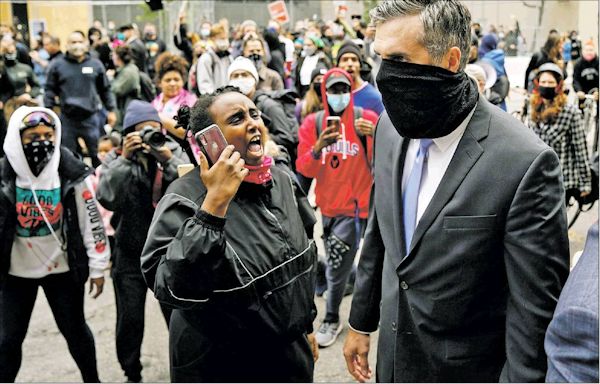
A protester yells at former officer Thomas Lane as he leaves a Minneapolis courtroom on September 11, 2020 (Star Tribune photo).
On September 11, Judge Cahill held a three-hour-plus hearing attended by all four defendants. Protesters gathered around the courthouse before the session started. The groupd set up a sound system and microphone. What followed was nearly four hous of music and emotional speeches. The crowd chanted, “Indict, convict, send those killer cops to jail! The whole damn system is guilty as hell!” When the defendants tried to make their way to their cars after the hearing, they were accosted by angry protesters.
Judge Cahill, in the hearing, removed Hennepin County Attorney Mike Freeman and three staffers from the case, citing sloppy work, including holding an ex parte meeting with a medical examiner in violation of state rules. The hearing also addressed evidentiary questions. Cahill was unsympathetic to a plan by three defense attorneys to introduce evidence that Floyd was involved in a 2019 drug case in Minneapolis and a 2007 drug-related robbery in Texas. Cahill asked, “What is the possible relevance of that [Texas] case in this case?” Cahill ruled against admitting evidence of either case, but cautioned the prosecution that if it argues at trial that Floyd had not ingested drugs around the time of his death, then defense attorneys could again request to admit evidence from the prior cases.
On October 7, 2020, Derek Chauvin posted bail on a $1 million bond Wednesday and was released from the state prison where he was being held pending trial. To protest his release, about 300 people marched peacefully from the site where Floyd died north toward downtown Minneapolis. Conditions for Chauvin’s release include that he remain law abiding, have no contact with Floyd’s family, not work in law enforcement or security, surrender any firearms and licenses to carry, and remain in Minnesota under court supervision. A few days after issuing his order, Judge Cahill modified it to allow Chauvin to move to a bordering state for reasons of his personal safety.
Judge Cahill, on October 22, dismissed the third-degree murder charge against Officer Chauvin. Cahill concluded that Minnesota law requires proof, in the case of third-degree murder, that the defendant caused the death of another person while committing an act inherently dangerous to others. In the case of George Floyd, not other individuals were placed at-risk, making the charge inappropriate. All other charges against Chauvin and the other three officers remain.
On November 4, Judge Cahill sided with the prosecution and ruled that all four officers would stand trial together. Cahill said that "they acted in concert with each other, and the evidence against them is similar, so it is right to try them in one trial.” The judge also denied a defense motion to move the trial out of the Twin Cities--at least for now, leaving open the possibility of a change in venue if it becomes impossible to seat an untainted jury because of the tremendous amount of pre-trial publicity. Cahill said, “The murder of George Floyd occurred in Minneapolis, and it is right that the defendants should be tried in Minneapolis.” Finally, he ruled that the news media can broadcast the trial. The judge cited the coronavirus pandemic, which limits the number of people who can be in the courtroom at any time, and the immense national and international interest in the case. Cahill wrote, "Protests demanding justice for George Floyd continue. . .It is expected that, even with some overflow courtrooms, the demand by family members, the public, and the press to attend the joint trial will outstrip the court’s ability to provide meaningful access.”
On November 17, assistant state Attorney General Matthew Frank filed a memorandum requested that prosecutors be allowed to show video of a 2017 arrest in which Derek Chauvin jammed his knee into the back of a 14-year-old boy for several minutes while ignoring his pleas that he couldn’t breathe. Frank argued that the footage showed that “when faced with a suspect who does not immediately comply with his demands, Chauvin intentionally uses a level of unreasonable force to accomplish subdual and restraint."
The video shows Chauvin and another officer responding to a domestic assault call in which a mother said she was assaulted by her son and daughter, who were both minors. The officers found the son lying on the floor in the back of the house and ordered him to get up. They told him he was under arrest. When the teen failed to respond, Chauvin grabbed him and struck the teen in the head with his flashlight and then grabbed him by the throat, before hitting him again with the flashlight. The video then shows Chauvin applying a neck restraint to the boy, causing him briefly to become unconscious. Chauvin keeps the teen in a prone position with a knee in his back for about 17 minutes until paramedics arrived. Judge Cahill gave no indication as to when he will rule on the admissibility of the so-called "Spreigl evidence."
On December 11, 2020, defense attorneys representing officer Tou Thao filed a motion asking that the trial of their client be moved from March 8 to July 5 because prosecutors delayed sharing key evidence with defense attorneys for months. They also asked that the court sanction prosecutors for their failure to share the information. Thao's attorneys stated, “The State has repeatedly disclosed discovery months after the Court ordered them to do so and has caused harm to the Defense’s preparation for trial, which in turn is endangering Mr. Thao’s federal and state Constitutional guaranteed rights to a fair trial.” Attorney General Keith Ellison, whose office is leading the prosecution, said, "The defense motion is without merit. The state disputes the defense’s inaccurate characterizations, and we look forward to providing the facts in our response to the court.” Thao’s attorneys stressed the harm caused by a delay in sharing an interview that Hennepin County Chief Medical Examiner Andrew Baker gave to investigators on July 8. Baker told investigators that Floyd’s death was caused by his health issues combined with his exertion and restraint by police before he was eventually pinned on his stomach in the street. Prosecutors were aware of the interview by at least Aug. 7, according to the attorneys’ motion, but didn’t disclose it to the defense until Oct. 28 — well after a Sept. 11 hearing in which both sides discussed a host of issues related to the case. Thao's attorneys asserted in their motion that prosecutors “knowingly withheld evidence that their medical examiner opined that the police restraint of George Floyd on the ground did not cause his death. … Not only did this disclosure violate the Court’s Order, but it appears to have been done in a manner designed to handicap the Defendant’s Motion to Dismiss for Lack of Probable Cause.”
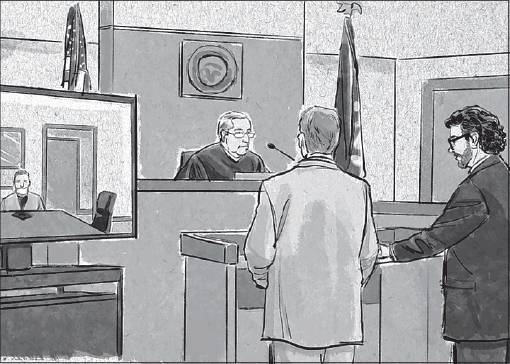
Attorneys for Chauvin argue a motion before Judge Cahill while Chauvin appears on closed-circuit television from prison (Cedri Hohnstadt, AP)
Eric Nelson, a defense attorney for Derek Chauvin, also argued that the trial be delayed because of prosecution abuses of the discovery process, including burying important information in between irrelevant material, providing duplicates of the same item and turning over thousands of pages of unrelated documents. Nelson asked for “any further relief the court deems just,” without specifying a sanction. Nelson said, “It appears as if the state has printed the reports, shuffled them like a deck of cards, and scanned them back into the computer to be disclosed,” Nelson wrote, adding that he has had to reorganize the evidence in a “massive undertaking.”
Judge Cahill had issued an order on June 30 requiring prosecutors to share all evidence with defense attorneys by Aug. 14. He also wrote, “Failure to make timely disclosure will presumptively result in preclusion of any matter not disclosed.”
On December 14, 2020, a coalition of local and national media companies filed a memorandum opposing a request by prosecutors in the George Floyd case to limit trial access to closed-circuit TV viewable only in the courthouse. The media companies asked Judge Cahill to stick with his plan to livestream the proceedings outside of the courthouse in order to provide courtroom access mandated by the Constitution while keeping people safe from COVID-19. Attorney General Keith Ellison’s office filed a motion on November 25 that asked Cahill to instead broadcast the trial via closed-circuit TV in an overflow courtroom with limited seats. The media memorandum argues, “No court has ever faced the challenges this Court is facing and no court has ever tried to address those challenges as this Court proposes. Given the circumstances, the Court’s accommodation is what the Constitution requires.” Attorneys for three of the charged officers also filed memorandums opposing the prosecution’s proposal to limit media coverage. The state had argued that witnesses “should not be forced to sacrifice their privacy or suffer possible threats of intimidation when they perform their civic duty and testify . . .The risks of broadcasting witness testimony are particularly acute where, as here, live video and audio coverage may be intimidating to some witnesses and make it less likely that they will testify, potentially interfering with a fair trial.”
On December 18, Judge Cahill reaffirmed his decision to allow livestreaming of the trial. He wrote, “Without question, deprivation of the constitutional rights that are the hallmarks of a public criminal trial would be a ‘manifest injustice. The only real issue then, is whether there is a reasonable alternative to televising the trial that would vindicate the defendants’ Sixth Amendment rights and the First Amendment rights of the public and the press. … The Court concludes that televising the trial is the only reasonable and meaningful method to safeguard the Sixth and First Amendment rights implicated in these cases.” Cahill cited the size of the Hennepin County courtrooms and the “unique and unprecedented situation” brought on by the COVID-19 pandemic as justifications for his decision. One of the Government Center’s largest courtrooms has been remodeled to meet to social distancing requirements, leaving only one seat in the courtroom that is not reserved for a trial participant. If the trial is televised, a technician will occupy the chair.
On December 31, prosecutors filed a motion seeking to delay the start of the officers' trial from March 2021 until June. Prosecutors cited the ongoing Covid-19 pandemic as the reason for the requested delay. In their motion, the prosecution suggested that putting off the trial until June 7 “appropriately balances the need to protect public health with the need to ensure that this case is resolved expeditiously.” The delay, they said, "would substantially reduce the risks to trial participants from COVID-19, and thereby reduce the risk that this trial is delayed or disrupted by a COVID-19 outbreak among the trial participants.” Defense attorneys, who previously requested a trial postponement, said they would not object to the motion, making a delay in the start of the trial all but certain. Officer Kueng’s attorney, Thomas Plunkett, found the timing of the prosecution’s motion "curious." He noted, "The pandemic has been around for a while.”
On January 7, 2021, a hearing was held to debate defense claims that the prosecution failed to comply with discovery orders. Judge Cahill indicated that he believed Assistant Attorney General Matthew acted in “good faith” in sharing evidence with the defense teams. But Cahill asked Frank on why his office took nine days to divulge an interview that Hennepin County Chief Medical Examiner Andrew Baker gave to investigators. (Baker told investigators Floyd’s death was caused by his health issues combined with his exertion and restraint by police when he was pinned on his stomach in the street.) Cahill said, “It seems like the first thing you do is … stamp it, send it through the scanner and send it to counsel." He said the delay in forwarding Baker's interview was “essentially not complying with the court’s order.” Frank argued that the delay was partly due to the document originating with federal authorities. “We are trying to get stuff out, and we’re doing that as quickly as we can," he said.
Judge Sets Dates for Two Trials
On January 12, in a much anticipated ruling, Judge Cahill ruled that Derek Chauvin would be tried separately from the other three officers and set his trial date for March 8, with opening arguments expected to begin around March 29. Cahill set the trial for officers Kueng, Lane, and Thao as August 23, 2021. The judge said that, for those three officers, the defendants’ defenses “will substantially overlap” and that separate trials would be complex and place an “undue burden” on state prosecutors and the court system. Minnesota Attorney General Keith Ellison, whose office is prosecuting the case, had pushed for a single trial for all four officers, said in a statement that he “respectfully disagreed” with the court’s decision, arguing that multiple trials “may retraumatize eyewitnesses and family members” and taint subsequent jury pools.
On January 28, prosecutors in the George Floyd case asked the Minnesota Court of Appeals to intervene and reverse Judge Cahill's decision to schedule two trials, one for Chauvin in the spring, and one for the other three officers in the summer. Assistant Attorney General Matthew Frank argued that there should be just one trial, delayed to a time in which all who wish to be vaccinated against Covid could be. Frank wrote: “The District Court’s decision … to proceed with two trials creates a serious public health risk" that "threatens serious harms to public health.” Frank called Cahill's decision “a clear abuse of power.” Generally, appellate courts are reluctant to second-guess trial judges on matters such the scheduling of trials. On February 12, the Minnesota Court of Appeals unanimously rejected the state's appeal and said that the Chauvin trial should go ahead as scheduled in March. Writing for the court, Presiding Judge Tracy Smith wrote, “The state has not established a basis for our review of the district court’s pretrial orders. Because we conclude that these appeals must be dismissed, we express no opinion on the merits of the district court’s rulings.”
Key Rulings on Admissible Evidence
On January 26, Hennepin County Judge Peter Cahill made a number of key evidentiary rulings, including the admissibility of past incidents in Derek Chauvin's police career. Cahill ruled that two incidents of alleged excessive use of force could be admitted, while several other incidents in which Chauvin used a neck or head restraint on a civilian could not be introduced as evidence. Judge Cahill also ruled that defense attorneys could not introduce evidence relating to a 2019 arrest of George Floyd during a traffice stop (during which Floyd swallowed pills and required transport to a hospital), or evidence of his conviction for aggravated robbery when he lived in Texas.
• In 2015, Chauvin and other officers responded to a suicidal and intoxicated male. Other officers used a stun gun on the male and placed him in a “side-recovery position.” Medical professionals later told the officers that if they had restrained him longer or delayed transporting him to a hospital he could have died.
• In 2017, Chauvin placed his knee on a female’s neck while she lay on the ground. Prosecutors wrote in a court filing that Chauvin kept his knee on her neck “beyond the point when such force was needed.”
Cahill also denied the prosecution’s request to admit evidence about nine incidents involving Officers Thao and Kueng.
New Charges Sought and Other Developments
On February 1, 2021, the Minneapolis Star Tribune obtained a video that showed officers Chauvin, Lane, Keung and a fourth officer (Luis Realivasquez) employing techniques to restrain a man that were similar to those used against Floyd. The video, involving an arrest of a man mistakenly identified as a suspect in a reported hostage-taking, was shot just three weeks before Floyd's death.
The video shows the three officers entering a building as an African-American, Adrian Drakeford, walked out. Drakeford carried what officers later said they thought to be a knife. Then, without any word or warning, they tackled him. As Keung and Lane handcuff Drakeford, Chauvin pulled a can of spray from his belt and ordered a gathering crowd to "Back up!" Bystanders begged the officers, roughly handling the suspect, to show mercy, but their pleas were ignored.
(Minnesota sentencing guidelines call for identical presumptive prison terms for second- and third-degree murder, but second-degree murder is punishable by up to 40 years in prison and third-degree murder is punishable by up to 25 years. The ruling could result in a delay of the start of the trial, scheduled for March 8, if Chauvin's attorney invokes his client's constitutional rights to a fair trial and argues that he needs more time to prepare for the added count. Asked for comment on the decision, Mitchell Hamline professor of law Joseph Daly said, "If Eric Nelson is handed — one week before trial — a new charge he has to deal with, that's pretty difficult,. You have to rethink almost your entire approach. You have to rethink your theory of the case. It's like a chess match."
